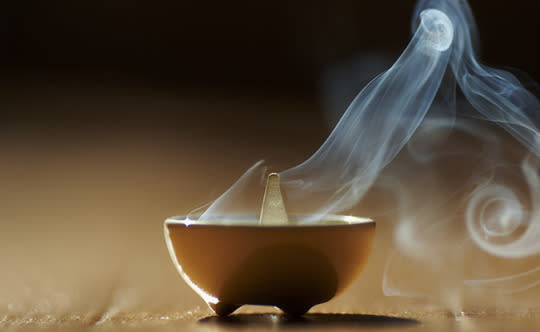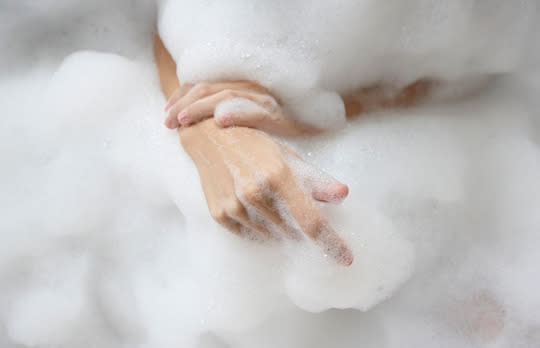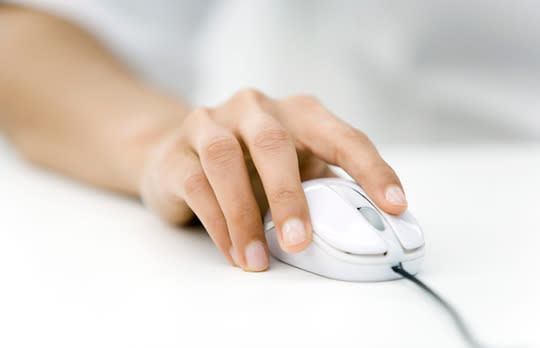Why Bath Time (And 6 Other Relaxation Techniques) Are Actually Bad For Your Health

(Photo: Getty Images)
At the end of a grueling workweek, you pour a glass of a nice cabernet blend, light a candle or incense stick, and nestle into the couch for an epic evening of Homeland or The Walking Dead. Sounds too delicious to be the least bit bad, you’d think. Buuuut you’d be wrong.
While everyone knows that chronic stress is toxic to mind and body and needs to be managed, some of the most popular de-stressing strategies can ultimately backfire, causing other problems. “Some activities are stress-relieving immediately but harmful in the long term,” says University of California, Riverside psychology professor Sonja Lyubomirsky, PhD, author of The Myths of Happiness. Obvious examples are bingeing on Halloween candy, smoking anything, and guzzling an entire bottle of wine by yourself. But it’s the less obvious examples that we need to worry about. (Snack and lose weight with this box of Prevention-approved treats from Bestowed.)
Read on for the habits and behaviors that feel good in the moment but ultimately bring you down. And as for what does relieve stress, Lyubomirsky recommends any activity that gets you contributing to your community or society, experiencing personal growth in some way, and/or connecting to others and building relationships. “Anything you do in the short-term that takes you away from these three goals is not going to be beneficial in the long run,” she says. Read more about how to relax by getting into flow state.
Burning Incense
You might like your living room to smell like a Buddhist temple or new age spa, but it may be more dangerous to inhale burned incense than cigarette smoke, according to a new study from South China University of Technology. Researchers found that incense smoke, which contains ultrafine and fine particles, some of which are highly toxic, is “mutagenic,” meaning that its chemical properties have the potential to change DNA, causing mutations that could lead to cancer. If you love the smell of incense, burn it only occasionally and be sure to crack the windows first to reduce your smoke exposure. The same advice holds true for scented paraffin candles, which may emit a number of potentially hazardous chemicals that can trigger allergy and asthma attacks and even migraines, according to research at South Carolina State University. Choose soy-based candles, which are not toxic, to keep your indoor air clear.
Related: 7 Weird Things Your Teeth Are Trying To Tell You
Binge-Watching Netflix
You’re ready for a marathon streaming session. You’ve got a cozy blanket, the remote, your partner, and…the blues? A recent study presented at the American Public Health Association’s meeting found a link between binge TV-watching, defined as 2 or more hours a day, and depression and anxiety. The researchers don’t yet know which comes first—whether depression and anxiety triggers binge-watching or whether binge-watching leads to depression and anxiety—but either way, being sedentary for long stretches has been linked to mental health problems. “Watching TV and movies is a good source of entertainment, but it should be done in moderation so as to not neglect work, family or health activity such as exercise,” says study co-author Monita Karmakar, MS, a doctoral candidate at the University of Toledo. Try to limit TV time, she advises, and after each episode, get up and move. “This gives you time to think about if you should be spending time watching the episode or doing other things that you may need to get done instead,” Karmakar says.
Related: 5 Signs You’re Not Getting Enough Vitamin D
Taking Bubble Baths

(Photo: Getty Images)
Tired, tense muscles love a hot soak, but when you add chemicals—in bubble bath, scented bath salts, or scented oils—your vagina may not be so happy. Harsh soaps and added fragrance can strip away protective oils and irritate delicate tissues, leading to uncomfortable dryness or worse. “All of those things can be irritating to the vulva if you have a tendency for vulval irritation, which is quite common,” says gynecologist Lauren F. Streicher, MD, clinical associate professor of obstetrics and gynecology at the Feinberg School of Medicine in Chicago. “Up to 70 percent of self diagnosed yeast infections are not yeast infections at all, but either bacterial vaginosis or this kind of vulval irritation.” Streicher advises women to wash their privates with plain warm water to retain the body’s natural humectants, and dry thoroughly with a clean towel.
Related: The New Stand Walmart’s Taking Against Animal Cruelty
Checking Social Media
Hey, let’s see what everyone’s up to! This friendly sounding mission can turn ugly fast when you find yourself jealous of your neighbor’s tropical beach getaway, saddened by someone’s death in the family, or intimidated by their promotion, award, or ridiculously talented child belting out the national anthem at a football game. Studies show that social media has the potential to be both helpful and harmful. “On the one hand, those who are shy, anxious or have unique or rare interests or problems are able to find support communities on the web,” Lyubomirsky says. “On the other hand, at least one study has shown that checking Facebook posts actually makes people less happy—in part because they implicitly compare themselves and feel like their life is not as good or exciting as that of the people posting.” Try minimizing your check-ins, especially if you’re already feeling stressed or down. And remember to maintain perspective: For every college acceptance or new sports car you see, there’s a speeding ticket, a busted dishwasher, and a bad hair day that you don’t see.
Going For A Run—Again

(Photo: Getty Images)
Exercise is fantastic for your overall health, mood, cognition, and mindset, and most Americans are guilty of not moving enough. But according to a 2015 study, you can overdo it with those long, heart-pounding runs. Danish researchers, writing in the Journal of the American College of Cardiology, found that high-intensity, high-mileage runners—those exceeding 7 mph for more than 4 hours a week or sprinting more than 2.5 hours a week on 3 days or more—die at the same rate as couch potatoes. The researchers, who followed 1,098 healthy runners and 3,950 non-runners for about 12 years, believe that such strenuous running may damage the heart over time. The study didn’t look at other forms of exercise, such as yoga or gardening, which are gentler on the cardiovascular system.
Related: Walk Off 5 Times More Belly Fat
Clicking “Buy”

(Photo: Getty Images)
Sure, a new lipstick or a crisp new phone case is momentarily uplifting, but retail therapy goes only so far as a stress-busting strategy—because you’re accruing debt and creating financial stress, possibly feeling guilty or ashamed, and cluttering up your space with stuff you likely don’t need. “Research shows that materialism is ultimately harmful to happiness—not to mention our planet,” says Lyubomirsky, “so if shopping essentially involves expressing materialistic impulses, then it’s going to make you unhappy and potentially impair your relationships in the long term.”
Sleeping In
Hiding under the covers for an extended snooze may be your idea of taking it easy, but too much sleep may be just as hazardous as too little. Research has linked chronic oversleeping—more than 9 hours a night—to heightened risk of depression, impaired brain function, weight gain, diabetes, and heart disease. And though it sounds counterintuitive, sleeping too long may actually make you feel lethargic and make it harder to focus. Sleeping past normal wakeup time on the occasional weekend is perfectly fine, but a healthy range for most people is between 7 and 9 hours a night. That will leave you rested and alert—and better able to deal with life’s many curveballs.
By Aviva Patz
This article ‘Why Bath Time (And 6 Other Relaxation Techniques) Are Actually Bad For Your Health’ originally ran on Prevention.com.
